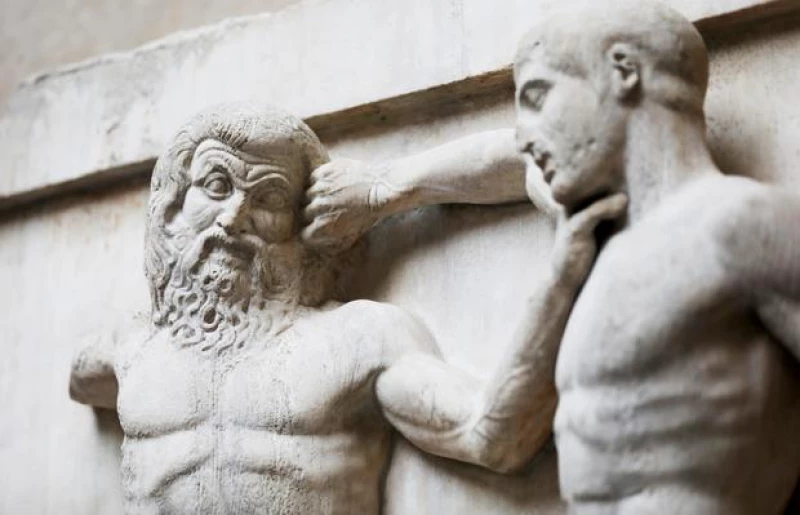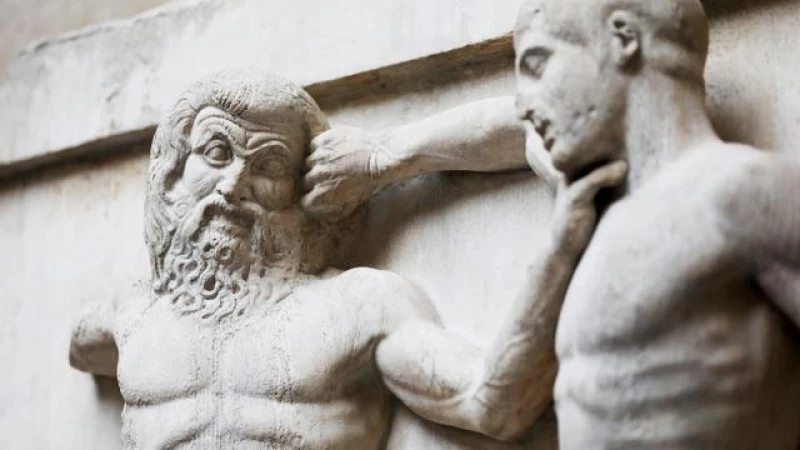Diplomatic Row Between Greece and UK Over Ancient Greek Sculptures
London — The U.K. government has cancelled a meeting between Prime Minister Rishi Sunak and his Greek counterpart amid a diplomatic row over which of the two nations should hold a collection of ancient Greek sculptures.
Greece and Britain have long argued over the Parthenon Sculptures, also known as the Elgin Marbles, which were once part of the Temple of Athena on the Acropolis in Athens. For years they have been part of the permanent collection at London's British Museum.
Prime Minister Kyriakos Mitsotakis had been expected to meet Sunak in London on Tuesday, but late Monday night, the Greek leader issued a statement to "express my annoyance at the fact that the British prime minister has cancelled our planned meeting a few hours before it was due to take place."

Speaking Sunday to the BBC, Mitsotakis said that having half of the Elgin Marbles in the U.K. was like "cutting the Mona Lisa in half," describing the sculptures as having been "essentially stolen" from Greece.
According to a report by the BBC, there seems to be a disagreement between the office of Chancellor Rishi Sunak and Greek leader Kyriakos Mitsotakis regarding the mention of the Parthenon sculptures during Mitsotakis' visit to the UK. Sunak's office believed that assurances had been given that the sculptures would not be mentioned, but a Greek official denied this.
Sources close to the Greek government have stated that Mitsotakis was "baffled" and "annoyed" by the snub.
The Labour party, who are currently leading Sunak's Conservatives in the polls ahead of an election year, have called the row "pathetic." Labour leader Keir Starmer met with Mitsotakis on Monday.
While the British Museum is not allowed to return the sculptures to Greece under UK law, there have been discussions between museum officials and Greek officials regarding a long-term loan deal. Labour has stated that they would not oppose such a deal.
A senior Conservative lawmaker has been quoted by the BBC as saying, "The Elgin Marbles are part of the permanent collection of the British Museum and belong here. It is reckless for any British politician to suggest that this is subject to negotiation."
The Parthenon sculptures, which were originally part of the Parthenon temple, were removed over 200 years ago by Lord Elgin of Scotland. They have been on display at the British Museum since 1817, when Elgin sold them to the British government.
In 1816, a British parliamentary committee deemed Lord Elgin's actions "entirely legal," a decision that is still upheld under UK law. However, the Greek culture ministry disagrees with this interpretation.
Greece Continues to Demand Return of Parthenon Sculptures
"By using methods of bribery and fraud, Elgin persuaded the Turkish dignitaries [of the then Ottoman Empire] in Athens to turn a blind eye while his craftsmen removed those parts of the Parthenon they particularly liked," reads a since-deleted page on its website. "Elgin's team was active on the Acropolis, hacking off and causing considerable damage to the sculptures and the monument, eventually detaching and dismembering a significant part (more or less half) of the remaining sculpted decoration of the Parthenon."
In 1983, Greece formally requested that all Parthenon sculptures be returned and, in 2009, it built the Acropolis Museum in Athens to house originals from the temple and "plaster copies of those retained in the British Museum and other foreign Museums."
On Tuesday, former Greek culture minister Irene Stamatoudi told the BBC the squabble "makes Rishi Sunak look no better than Lord Elgin."
The British Museum has been embroiled in multiple controversies over artifacts obtained during the colonial period.
Egypt, Nigeria, Iran and other countries have demanded the return of what they insist are stolen artifacts over the years.
Since 1997, the British Museum has been researching whether, "works that had previously been stolen by the Nazis in the period 1933–1945 had unwittingly been acquired" and become part of its collections, according to its website.







